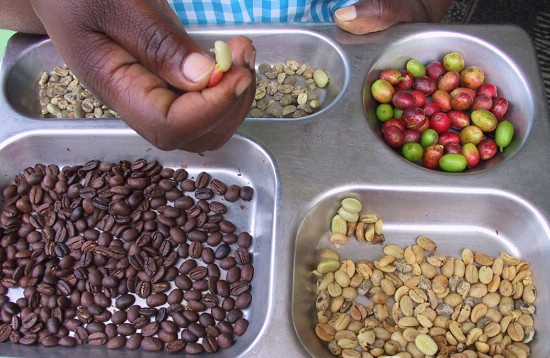Introduction to the characteristics of Kilimanjaro Coffee Flavor Manor in Tanzania
In December 1992, the Zanzibar government joined the Organization of the Islamic Conference (OIC) without authorization, which was strongly opposed by the coalition government and was forced to withdraw in 1993.
In October 1995, the first multi-party general election was held in Tanzania. Mkapa was elected president of the United Republic, and Salmin was re-elected president of Zanzibar by a narrow margin.
After 1996, the Sang opposition party stepped up its action against the coalition. With the firm support of the coalition government, the mulberry government has taken tough measures to suppress opposition activities and resolutely safeguard the coalition system.
In October 2000, Mkapa was re-elected president of the United Republic, and Karume, a candidate of the Revolutionary Party, was elected president and repeatedly expressed his position of safeguarding national unity, which further dealt a blow to the separatist forces.
Since 2001, the coalition government has continued to consolidate unity, maintain the coalition regime, strive for moderate forces, crack down on the separatist forces in Zanzibar, and take care of the allocation of budgetary funds and other issues related to Zanzibar's vital interests. Instead of openly advocating separation, URUF has demanded that Zanzibar be given more autonomy.
In December 2005, Kikwete was elected President of the United Republic, and Karume was elected President of the United Republic.
In early 2008, the Revolutionary Party and the RUF held negotiations on the establishment of a coalition government in Zanzibar, but no agreement was reached.
In 2009, the joint issue of Tanzania and mulberry has made some progress, but the dispute between the mainland and Sangdao on the ownership of mulberry oil and gas resources has heated up. Political reconciliation negotiations between the Sangdao Revolutionary Party and the main opposition party RUF resumed at the end of the year after a break at the beginning of the year. President Karume of Sang and General Secretary of RUF Hamad held historic talks, which attracted widespread attention from all parties.
In early 2010, there was a new trend of political reconciliation in Sangdao, and the Revolutionary Party and the Public RUF reached an agreement on the formation of a Sangdao unity government. In July of the same year, the Sang referendum passed a resolution on establishing a government system of national unity. In November, the general election of Sang was held smoothly, and the government of national unity was established on Sangdao. President Sang, the second vice president and 11 ministers came from the Revolutionary Party. Sang's first vice president and 8 ministers came from the RUF.
Mount Mount Kilimanjaro, located in northeastern Tanzania, is the highest mountain in Africa at 5895 meters above sea level. The ultra-high altitude makes the top of the mountain snow all the year round, while Tanzania's main coffee producing area is located at the foot of Mount Kilimanjaro. The area is rich in volcanic soil, which brings an adequate supply of nutrients for the growth of coffee trees. Coffee trees are generally planted at high elevations above 1150 meters, which is one of the prerequisites for Arabica to develop a high-quality flavor.
Tanzanian coffee is mostly washed. After picking, coffee farmers will send the coffee fruit to the nearest processing plant for processing. The treatment step of the water washing method is to screen and remove the impurities in the coffee fruit, then remove the coffee pulp and exocarp, and send it into the fermentation tank to remove the pectin layer on the inner pericarp by fermentation. clean and then dry. Coffee in Tanzania is graded in the same way as in Kenya, both according to the size of coffee beans. Let the raw coffee beans pass through the screen with fixed size holes when screening. The larger the number of the screen is, the larger the particles of the raw coffee beans are. The grades of flat beans distinguished by size are mainly AA+, AA and AB. In addition, PB (peaBerry), which is produced more in Kenya and Tanzania, also has a set of sieve size standards. The main coffee producing areas in Tanzania are located at the foot of Mount Kilimanjaro. The area is rich in volcanic soil, and some coffee trees planted here are more than 100 years old. Coffee was first introduced by Christians from Kenya to grow coffee. Coffee trees must be carefully taken care of, weeded and fertilized. Moreover, old branches must be cut off so that new branches can grow to maintain the quality of coffee beans. Coffee bean processing plants are well equipped; coffee beans are an important economic crop in Tanzania, and the local government attaches great importance to this industry.
Feature editor
Kilimanjaro coffee is a uniform size of large coffee beans, the color is gray-green, compared with a strong sour and sweet flavor, excellent flavor. Moderate baking will give off sweetness and light sour taste, deep baking will produce soft bitterness, suitable for blending

Important Notice :
前街咖啡 FrontStreet Coffee has moved to new addredd:
FrontStreet Coffee Address: 315,Donghua East Road,GuangZhou
Tel:020 38364473
- Prev

Kenyan Jinchu Valley characteristics of Kenyan Jinchu Valley
According to local media reports, major coffee producing areas such as Nieli and Migoli have negotiated agreements with buyers from China. According to the agreement, local coffee farmers will sell coffee directly to Chinese merchants at a price of about 250 shillings ($2.90) per kilogram. Some people with vested interests have protested against this practice. Two weeks ago, some Western companies warned coffee people through the media, saying that such as
- Next

Introduction to the flavor of boutique coffee beans in manor
The bean comes from a single farm, Ethiopia, and is processed by the Waka Cooperative (Worka cooperative). Alemayehu Alako Farm is a member of the Waka Cooperative. The Waka Cooperative, located in the south of Gedeb District, was founded in 2005 and joined the famous Yejia Sheffield Coffee Farmers Cooperative Union (YCFCU,Yirgacheffe Coffee Farmers Cooperati).
Related
- Detailed explanation of Jadeite planting Land in Panamanian Jadeite Manor introduction to the grading system of Jadeite competitive bidding, Red bid, Green bid and Rose Summer
- Story of Coffee planting in Brenka region of Costa Rica Stonehenge Manor anaerobic heavy honey treatment of flavor mouth
- What's on the barrel of Blue Mountain Coffee beans?
- Can American coffee also pull flowers? How to use hot American style to pull out a good-looking pattern?
- Can you make a cold extract with coffee beans? What is the right proportion for cold-extracted coffee formula?
- Indonesian PWN Gold Mandrine Coffee Origin Features Flavor How to Chong? Mandolin coffee is American.
- A brief introduction to the flavor characteristics of Brazilian yellow bourbon coffee beans
- What is the effect of different water quality on the flavor of cold-extracted coffee? What kind of water is best for brewing coffee?
- Why do you think of Rose Summer whenever you mention Panamanian coffee?
- Introduction to the characteristics of authentic blue mountain coffee bean producing areas? What is the CIB Coffee Authority in Jamaica?

